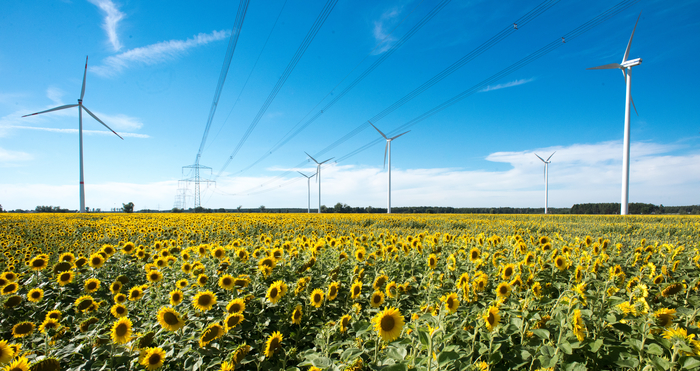Steinbach: "Expansion of renewable energies more important than ever"
"Climate change with its negative effects on our lives and our environment requires a rapid and comprehensive transformation to a climate-neutral, reliable, environmentally compatible, economic and socially accepted energy supply system. Brandenburg initiated this transformation very early on with its Energy Strategy 2030 and is now continuing with its Energy Strategy 2040, which is currently in progress. In order to achieve the goal of climate neutrality by 2045, photovoltaics and wind, hydropower and bioenergy must all make their contribution. We can only achieve the energy turnaround toward climate neutrality if we increasingly rely on renewable energies. Against the background of the current energy policy situation, their expansion is more important than ever." This was stated by Energy Minister Prof. Dr.-Ing. Jörg Steinbach today at the Energy Day.
The conference focused on the question of how a climate-friendly transformation of Brandenburg's economy can succeed. The Energy Day was organized by the Brandenburg Ministry of Economic Affairs, Labor and Energy in cooperation with the Brandenburg University of Technology Cottbus-Senftenberg and the Brandenburg Chambers of Industry and Commerce.
Prof. Dr. Gesine Grande, President of the BTU Cottbus-Senftenberg, emphasized: "The Brandenburg University of Technology Cottbus-Senftenberg is a young university that is actively involved in shaping structural change in Lusatia and providing scientific support. In our four profile lines, including 'Energy Turnaround and Decarbonization', practical solutions are being developed for shaping the major global issues - towards a sustainable and climate-friendly future. We are very pleased to co-host the 22nd Brandenburg Energy Day, to welcome the industry to BTU and to inform participants about our research and structural change projects on energy transition."
Representing the Brandenburg Chambers of Commerce and Industry, Dr. Wolfgang Krüger, Chief Executive Officer of the Cottbus Chamber of Commerce and Industry, said, "The motto of Energy Day accurately describes the challenges facing the economy and society. The program shows how these are already being met with full commitment, both regionally and nationally, through concrete projects and plans for climate-neutral transformation. It is important that Lusatia also provides impetus in this context so that innovative economic power and climate neutrality go together even better in the future."
Minister Steinbach explained that it was not yet foreseeable what specific measures the Brandenburg Climate Plan would include for industry. "But industry must prepare itself for the fact that the requirements to significantly reduce its greenhouse gas emissions will become more stringent in the coming years. It will be a matter of improving energy efficiency and avoiding energy- and process-related emissions. Industry should already prepare for increasing requirements today and take advantage of all opportunities for energy efficiency, greenhouse gas-reducing technologies and innovative manufacturing processes," appealed the Energy Minister.
Steinbach pointed out that the state government had already anchored sector coupling and power-to-X technologies in its energy strategy in 2012. "This is because sector coupling is essential for the success of the energy transition and more climate protection. Power-to-X technologies that generate climate-neutral hydrogen from renewable energies can be the key to the success of the energy transition. This is because hydrogen enables the coupling of the electricity, heat, transport and industry sectors," the minister said. Steinbach continued, "We are talking about innovative technologies with major industrial policy opportunities for Brandenburg. This can mean additional regional value creation and employment - in other words, exactly what is urgently needed for the successful structural development of the state. That's why we've been pushing ahead with our efforts to build a hydrogen economy in a very targeted way for some time now and have also underpinned this with our hydrogen strategy."
Against the backdrop of national and European resolutions on climate neutrality, Brandenburg is more than ever faced with the challenge of decarbonizing its heating networks as well, Steinbach emphasized. "With a share of around 40 percent of energy-relatedCO2 emissions, the heating sector - space heating, hot water, process heat - plays a key role in achieving climate targets. In addition to more energy-efficient heating technology and building insulation, this also involves greater integration of climate-friendly energy sources," said the minister.
There will be no "one-size-fits-all solution" for the upcoming transformation process in the heating sector either, he made clear. "Rather, individual concepts and technologies are needed for different areas of application that take into account the regionally different conditions. There will be centralized and decentralized solutions, but also isolated solutions," the minister explained. Compared to other German states, Brandenburg, as an area with good potential for renewable energy generation, has favorable starting conditions for the decarbonization of heating networks.

